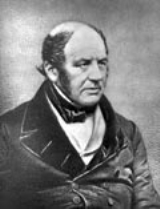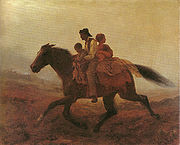
Drapetomania
Encyclopedia
Drapetomania was a supposed mental illness
described by American
physician Samuel A. Cartwright
in 1851 that caused black slaves to flee captivity. Today, drapetomania is considered an example of pseudoscience
, and part of the edifice of scientific racism
. The term derives from the Greek δραπετης (drapetes, "a runaway [slave]") + μανια (mania, "madness, frenzy").

 Cartwright described the disorder — which, he said, was "unknown to our medical authorities, although its diagnostic symptom, the absconding from service, is well known to our planters and overseers" — in a paper delivered before the Medical Association of Louisiana that was widely reprinted.
Cartwright described the disorder — which, he said, was "unknown to our medical authorities, although its diagnostic symptom, the absconding from service, is well known to our planters and overseers" — in a paper delivered before the Medical Association of Louisiana that was widely reprinted.
He stated that the malady was a consequence of masters who "made themselves too familiar with [slaves], treating them as equals".
In Diseases and Peculiarities of the Negro Race, Cartwright writes that the Bible calls for a slave to be submissive to his master, and by doing so, the slave will have no desire to run away.
In addition to identifying drapetomania, Cartwright prescribed a remedy. His feeling was that with "proper medical advice, strictly followed, this troublesome practice that many Negroes have of running away can be almost entirely prevented." In the case of slaves "sulky and dissatisfied without cause" — a warning sign of imminent flight — Cartwright prescribed "whipping
the devil out of them" as a "preventative measure". As a remedy for this disease, doctors also made running a physical impossibility by prescribing the removal of both big toes.
Mental illness
A mental disorder or mental illness is a psychological or behavioral pattern generally associated with subjective distress or disability that occurs in an individual, and which is not a part of normal development or culture. Such a disorder may consist of a combination of affective, behavioural,...
described by American
United States
The United States of America is a federal constitutional republic comprising fifty states and a federal district...
physician Samuel A. Cartwright
Samuel A. Cartwright
Samuel Adolphus Cartwright was a physician who practiced in Mississippi and Louisiana in the antebellum United States. During the American Civil War he joined the Confederate States of America and was assigned the responsibility of improving sanitary conditions in the camps about Vicksburg,...
in 1851 that caused black slaves to flee captivity. Today, drapetomania is considered an example of pseudoscience
Pseudoscience
Pseudoscience is a claim, belief, or practice which is presented as scientific, but which does not adhere to a valid scientific method, lacks supporting evidence or plausibility, cannot be reliably tested, or otherwise lacks scientific status...
, and part of the edifice of scientific racism
Scientific racism
Scientific racism is the use of scientific techniques and hypotheses to sanction the belief in racial superiority or racism.This is not the same as using scientific findings and the scientific method to investigate differences among the humans and argue that there are races...
. The term derives from the Greek δραπετης (drapetes, "a runaway [slave]") + μανια (mania, "madness, frenzy").


He stated that the malady was a consequence of masters who "made themselves too familiar with [slaves], treating them as equals".
"If any one or more of them, at any time, are inclined to raise their heads to a level with their master or overseer, humanity and their own good requires that they should be punished until they fall into that submissive state which was intended for them to occupy. They have only to be kept in that state, and treated like children to prevent and cure them from running away."
In Diseases and Peculiarities of the Negro Race, Cartwright writes that the Bible calls for a slave to be submissive to his master, and by doing so, the slave will have no desire to run away.
In addition to identifying drapetomania, Cartwright prescribed a remedy. His feeling was that with "proper medical advice, strictly followed, this troublesome practice that many Negroes have of running away can be almost entirely prevented." In the case of slaves "sulky and dissatisfied without cause" — a warning sign of imminent flight — Cartwright prescribed "whipping
Flagellation
Flagellation or flogging is the act of methodically beating or whipping the human body. Specialised implements for it include rods, switches, the cat o' nine tails and the sjambok...
the devil out of them" as a "preventative measure". As a remedy for this disease, doctors also made running a physical impossibility by prescribing the removal of both big toes.
See also
- Classification of mental disordersClassification of mental disordersThe classification of mental disorders, also known as psychiatric nosology or taxonomy, is a key aspect of psychiatry and other mental health professions and an important issue for consumers and providers of mental health services...
- Dysaethesia AethiopicaDysaethesia AethiopicaIn psychiatry, dysaethesia aethiopica was an alleged mental illness described by American physician Samuel A. Cartwright in 1851, which proposed a theory for the cause of laziness among slaves...
- Fugitive slaveFugitive slaveIn the history of slavery in the United States, "fugitive slaves" were slaves who had escaped from their master to travel to a place where slavery was banned or illegal. Many went to northern territories including Pennsylvania and Massachusetts until the Fugitive Slave Act of 1850 was passed...
- Hate crimeHate crimeIn crime and law, hate crimes occur when a perpetrator targets a victim because of his or her perceived membership in a certain social group, usually defined by racial group, religion, sexual orientation, disability, class, ethnicity, nationality, age, gender, gender identity, social status or...
- Scientific racismScientific racismScientific racism is the use of scientific techniques and hypotheses to sanction the belief in racial superiority or racism.This is not the same as using scientific findings and the scientific method to investigate differences among the humans and argue that there are races...
- The Protest Psychosis: How Schizophrenia Became a Black DiseaseThe Protest Psychosis: How Schizophrenia Became a Black DiseaseThe Protest Psychosis: How Schizophrenia Became a Black Disease is 2010 book written by psychiatrist Jonathan Metzl , and published by Beacon Press, covering the history of the 1960s Ionia State Hospital—located in Ionia, Michigan and now converted to a prison...
Sources
- Samuel A. Cartwright, "Report on the Diseases and Physical Peculiarities of the Negro Race", The New Orleans Medical and Surgical Journal 1851:691-715 (May).
- Reprinted in DeBow's ReviewDeBow's ReviewDeBow's Review was a widely circulated magazine of "agricultural, commercial, and industrial progress and resource" in the American South during the upper middle of the 19th century, from 1846 until 1884. It bore the name of its first editor, James Dunwoody Brownson DeBow DeBow's Review was a...
XI (1851). Available at Google Books and excerpted at PBS.org. - Reprinted in Arthur Caplan, H. Tristram Engelhardt, Jr., and James McCartney, eds, Concepts of Health and Disease in Medicine: Interdisciplinary Perspectives (Boston: Addison-Wesley, 1980).
- Reprinted in Arthur L. Caplan, James J. McCartney, Dominic A. Sisti, eds, Health, Disease, and Illness: Concepts in Medicine (Washington, D.C.: Georgetown University PressGeorgetown University PressGeorgetown University Press, founded in 1964, is an American publishing house that publishes forty new books a year. The press is a member of the Association of American University Presses and a founding member of the Association of Jesuit University Presses .It supports the academic mission of...
, 2004) ISBN 1589010140
- Reprinted in DeBow's Review

